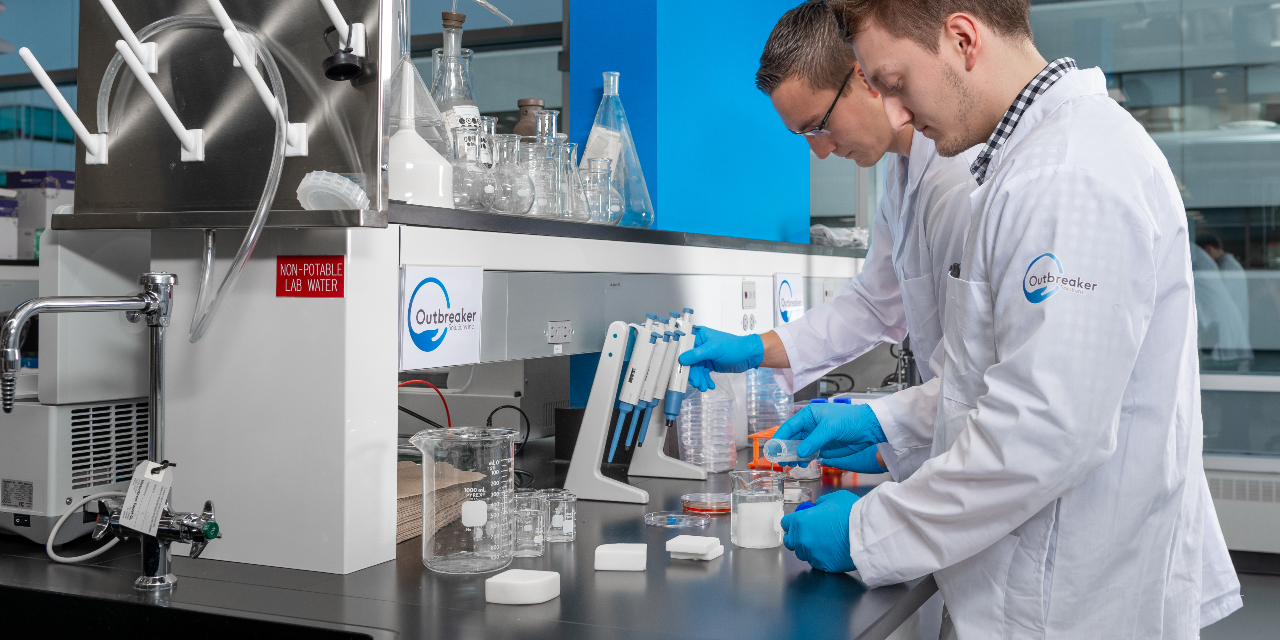An Edmonton-based startup company has teamed up with University of Alberta researchers to help prevent the spread of viruses, such as the one that causes COVID-19, through a simple but innovative solution: compressed salt surfaces in high-traffic areas.
Outbreaker Solutions' research shows that surfaces made out of compressed sodium chloride (CSC) have strong antibacterial and antifungal effects, killing microbes in minutes while other commonly used materials retain them for hours or days.
Since recent studies have also proved that salt can kill influenza viruses, the company is embarking on a new research project to confirm it can work on other intestinal and respiratory viruses, such as norovirus-which causes up to 70 per cent of gastroenteritis outbreaks in Alberta-and SARS-CoV-2, the virus that causes COVID-19.
"The public is starting to catch up with long-known statistics showing that the vast majority of infections are spread by our hands, rather than through the air. This will become a more important field as they learn more about infection control, and it's being forcibly accelerated by our current pandemic," said Brayden Whitlock, Outbreaker's director of research and PhD candidate in the U of A's Department of Physiology.
To carry out the investigation, Outbreaker partnered with Xiao-Li Lilly Pang, professor in the Department of Laboratory Medicine and Pathology and program leader of microbiology at the Provincial Public Health Laboratory.
Over the past two months, they have combined Pang's team's expertise and facilities for virus research with Outbreaker's products and the infrastructure support it receives as part of the UAlberta Health Accelerator, located at TEC Centre Labs in downtown Edmonton's Enterprise Square.
"We already know that the SARS-CoV-2 virus survives different times on surfaces of copper, plastic and stainless steel. I am very interested to learn whether the CSC surface could inactivate the SARS-CoV-2 virus," said Pang, who is also a co-lead of the Alberta Provincial Pediatric EnTeric Infection Team (APPETITE).
Outbreaker's goal is to provide an additional layer of safety to the population by preventing infections from occurring in the first place-especially in health-care environments.
"Both health-care workers and patients need increased infection safety," said Whitlock, noting that studies show attempting to change people's behaviour has little effect.
"Part of it is due to having insufficient time and resources, and part of it is human nature. Countless studies have tried, and of the few that had any effect, the results were very underwhelming. Our proposed part of the solution requires no behavioural change, no extra maintenance or cleaning."
Pang said there isn't yet a drug or vaccine that works against noroviruses, nor are there effective sanitizers and disinfectants to inactivate noroviruses and break off their spread.
"If CSC surfaces have a virucidal effect, it would be an ideal material to coat layers on hard surfaces in hospitals, long-term care centres, cruise ships and the food processing industry, where outbreaks frequently occur and have a significant health impact," added Pang.
The teams are working to find more funding to advance the research. Outbreaker is also looking for partners to manufacture and take their innovation to public settings as soon as possible.
The company is now developing CSC door push plates and levers, but says there is an increasing demand for other products such as hospital bedrails and public transit handles as well.
According to Whitlock, the material makes the products potentially more affordable than current options for high-traffic areas, and a much-needed option for health-care facilities.
"This is why we have developed our platform around regular table salt-it's fast, safe and affordable. We intend to supply much better surfaces without increasing costs," he said.
"People need to have confidence that they can seek medical care without coming out even sicker. Right now, in Canada and the United States the statistics are not conducive to that confidence. Health-care workers and patients deserve better."
